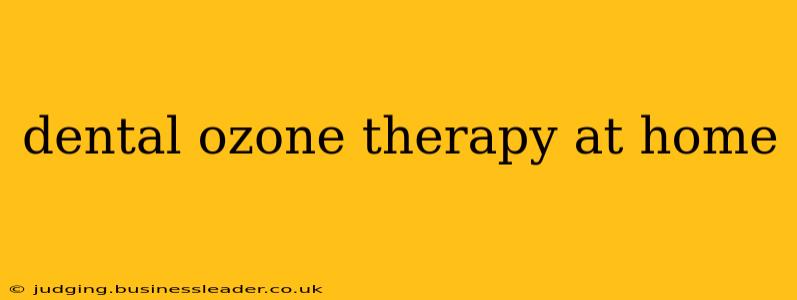Ozone therapy has gained popularity as a purported alternative treatment for various health issues, including dental problems. While some dentists incorporate ozone into their practices, at-home dental ozone therapy is generally not recommended and lacks scientific backing. This article will explore the claims surrounding at-home ozone therapy for dental issues, address safety concerns, and offer safer alternatives for maintaining oral health.
What is Ozone Therapy?
Ozone therapy involves using ozone gas (O3), a highly reactive form of oxygen, to treat various conditions. Proponents suggest it possesses antimicrobial and anti-inflammatory properties. In professional dental settings, ozone may be used to treat gum disease, tooth sensitivity, or as an adjunct to other procedures. However, the use and efficacy in these contexts are still under investigation and not universally accepted within the dental community.
Can I Use Ozone for Teeth Whitening at Home?
While some websites and products promote at-home ozone teeth whitening, this is strongly discouraged. The concentration of ozone needed for effective whitening is potentially dangerous. Improper use can lead to lung damage, irritation of the respiratory system, and other adverse health effects. Furthermore, the long-term effects of at-home ozone exposure on teeth and gums are unknown. Safer and proven methods for teeth whitening are readily available through dental professionals.
Is Ozone Therapy Safe for Treating Cavities at Home?
Absolutely not. Ozone is not a proven or effective treatment for cavities. Cavities require professional dental intervention, typically involving fillings or other restorative procedures. Attempting to treat a cavity with at-home ozone is dangerous and ineffective. Ignoring a cavity can lead to more serious dental problems like infection and tooth loss.
What are the Risks of At-Home Dental Ozone Therapy?
The risks associated with at-home dental ozone therapy are substantial and outweigh any potential benefits. These risks include:
- Lung damage: Inhaling ozone gas can severely damage the lungs.
- Respiratory irritation: Ozone can irritate the airways, causing coughing, wheezing, and shortness of breath.
- Tissue damage: Direct contact with high concentrations of ozone can damage soft tissues in the mouth.
- Ineffectiveness: At-home ozone devices are unlikely to deliver the correct concentration or application needed for any purported benefit.
- Lack of regulation: At-home ozone devices are often unregulated, meaning their safety and effectiveness are not guaranteed.
What are the Alternatives to At-Home Ozone Therapy for Dental Care?
Maintaining good oral hygiene is crucial for preventing dental problems. Instead of resorting to unproven methods like at-home ozone therapy, focus on these proven practices:
- Regular brushing and flossing: Brush your teeth twice a day with fluoride toothpaste and floss daily to remove plaque and food particles.
- Regular dental checkups: Visit your dentist for regular checkups and cleanings to detect and address potential problems early.
- Healthy diet: Limit sugary and acidic foods and drinks, as they contribute to tooth decay.
- Fluoride treatments: Your dentist can recommend fluoride treatments to strengthen tooth enamel.
Are there any legitimate uses of ozone in dentistry?
While the use of ozone in dentistry is still under investigation, some dentists are exploring its potential benefits in specific contexts. These applications are typically performed under professional supervision in controlled settings, and the efficacy is not yet universally accepted within the dental community. It is crucial to discuss any proposed ozone treatments with your dentist to determine their suitability and potential risks.
This information is for educational purposes only and should not be considered medical advice. Always consult with a qualified dentist for any concerns about your oral health. They can provide accurate information and recommend appropriate treatments. Remember, maintaining good oral hygiene through proven methods is the most effective way to prevent and address dental problems.
